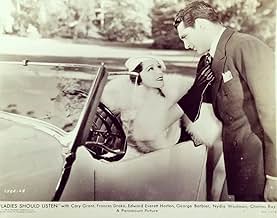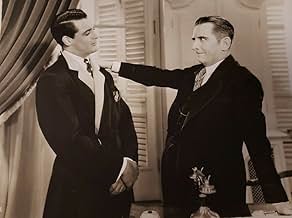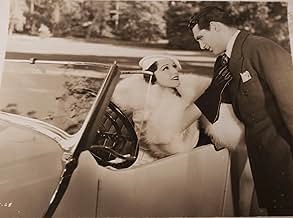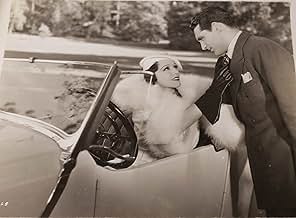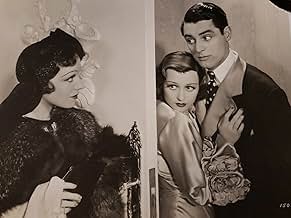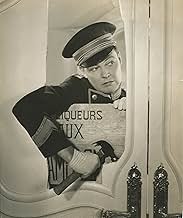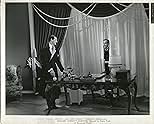The switchboard operator in an apartment building falls in love with a businessman who lives in the building, whom she has gotten to know only over the phone. When she discovers that the man... Read allThe switchboard operator in an apartment building falls in love with a businessman who lives in the building, whom she has gotten to know only over the phone. When she discovers that the man's current girlfriend is actually part of a scheme to swindle him out of some mineral righ... Read allThe switchboard operator in an apartment building falls in love with a businessman who lives in the building, whom she has gotten to know only over the phone. When she discovers that the man's current girlfriend is actually part of a scheme to swindle him out of some mineral rights he owns, she devises a plot to save him and expose the con artists.
- Awards
- 2 wins total
- Ramon Cintos
- (as Rafael Corio)
- Adele
- (as Clara Lou Sheridan)
- Butler
- (as Joe North)
Featured reviews
The woman who brings him to his senses is the switchboard operator of his apartment building, Anna. Anna knows every detail of Julian's many affairs and has fallen in love with him via listening in on his phone conversations. She knows why each love affair occurred and why each ended. She also knows from her connections with other operators, just what Marguerite and her husband are up to.
Julian is flattered by Anna's adoration, but in no way returns it. From the time that Anna's secret love is out in the open, Anna wages war against the evil couple who are trying to dupe Julian. Her weapon: the switchboard.
A man with the morals of an alley cat just needs the right woman to show him the path to true love.
* 1/2 (out of 4)
Julian De Lussac (Cary Grant) is a businessman who is going broke so he falls in love with a woman (Nydia Westman) to try and get her money. Soon she begins to lose interest so while on the phone with her he pretends to commit suicide, which sends switchboard operator Anna (Frances Drake) into his room. It turns out that Anna has been listening to all of Julian's calls and knows everything about him. Before long Julian has a third woman after film.
LADIES SHOULD LEAVE is a pretty darn bad movie on many levels. Well, I guess I should say that it's your typical plot less "B" movie that would have been shown as the second or third feature back in the day. If you took Grant out of this picture then there really wouldn't be a reason to watch it and even with the screen legend it's hard to actually recommend this thing.
The script is a complete mess from start to finish as nothing is ever really explained and things just seem to happen for no reason. Even worse is the fact that the film is a complete bore with only a couple laughs scattered throughout its 60-minute running time. The characters are all rather shallow and boring. Even the switchboard operator is more creepy than anything else.
The story revolves around Julian De Lussac (Cary Grant), a Parisian man-about-town who, through no fault of his own, gets himself involved with three women at the same time, including one in particular, Anna Mirelle (Frances Drake), a switchboard operator who listens in on Julian's telephone conversations, who becomes his protector. Aside from Susie Flamberg (Nydia Westman), an comely bespectacled young lady who does her best to garner Julian's attention in spite of being engaged to Paul Vernet (Edward Everett Horton), matters become complicated when Marguerite Cintos (Rosita Moreno), who, along with her husband, Ramon (Rafael Corio), make attempts in having Julian as their next blackmailing victim.
The supporting cast consists of George Barbier as Susie's father, Joseph; Charles E. Arnt as Albert, the manservant; Charles Ray, a once popular leading man of the silent screen now appearing in minor roles, playing Henri, the building porter who loves operator gal Anna; with Henrietta Burnside and Joe North in smaller roles. Sad-eyed and dark-haired beauty Frances Drake, an up-and-coming Paramount starlet, works well as the nosy switchboard girl who gets herself involved in a playboy's escapades, while Nydia Westman, in her Una Merkel-type manner, provokes some solid laughs with her man-chasing performance. One scene finds her telephoning Julian (Grant), telling him some interesting news, "I'm in bed!"
LADIES SHOULD LISTEN became the second and final comedy to pair Grant and Horton of equal star status. (Horton appeared in future Grant comedies, including Columbia's HOLIDAY in 1938, and the madcap Warner Brothers comedy, ARSENIC AND OLD LACE in 1944). They had previously worked well together in the funnier KISS AND MAKE UP (1934), which consists faster pace, silly comedy climaxed by an amusing car chase. As for LADIES SHOULD LISTEN, it lacks the quicker pace KISS AND MAKE UP has, and gives the impression of being an early 1930s talkie since much of it takes takes place in Julian's boudoir. No song numbers are inserted as the earlier film, however, it does include familiar underscoring, "Falling in Love Again," a song introduced and immortalized by Marlene Dietrich in the German produced musical-drama, THE BLUE ANGEL (1930).
With the screenplay by Claude Binyon and Frank Butler, LADIES SHOULD LISTEN should have been more amusing, and with Ernst Lubitsch in the director's chair, who had worked wonders with material such as this, it would have been, especially with Cary Grant in the lead. What's equally surprising is that this comedy is relatively short, 62 minutes. Out of circulation in the television markets for quite some time now (having been presented on New York City's WPIX, Channel 11, prior to 1972) LADIES SHOULD LISTEN, might be something to consider if it should ever be resurrected on television again. "Operator, please connect me to Turner Classic Movies programming department." One final note, star searchers, look closely for future leading actress, Ann Sheridan, appearing briefly as a fellow switchboard operator named Blanche. (**)
In the case of The Smiling Lieutenant, Maurice Chevalier is the love interest the daughter seeks, but in this case it's Cary Grant. When watching an old copy of this movie I actually thought for a moment based on the dialog that Nydia Westman was Caudette Colbert and had to do a double take at the credits.
These are probably formula roles for comedy by this time in the 30s, kind of a formula for haphazard comedy. Never the less, it's fun to watch and not bad. Wish I had a better sounding audio on the copy I saw. I wonder if there are even any good masters of this film available that could meet Turner's quality requirements for release. I give it a solid 7 perhaps it would rate a little better if there had been better audio.
Did you know
- TriviaOne of over 700 Paramount Productions, filmed between 1929 and 1949, which were sold to MCA/Universal in 1958 for television distribution, and have been owned and controlled by Universal ever since. It's earliest documented telecast took place in Omaha Monday 16 November 1959 on KETV (Channel 7); despite the presence of a youthful Cary Grant, sponsor resistance to its age and the pre-code aspects of its story resulted in its only rarely being taken out of the vault in other locations; the next visible exception was in San Francisco where it aired Sunday 24 April 1960 on KPIX (Channel 5). It was released on DVD 19 April 2016 as one of 18 [Paramount] films in Universal's Cary Grant - The Vault Collection, and again as a single 6 September 2016 as part of the Universal Vault Series.
- Quotes
Julian De Lussac: Did you ever try to go through a telephone directory, page by page?
Paul Vernet: No, but I'm reading "Anthony Adverse."
[the rambling 1933 historical adventure novel by Hervey Allen]
Details
- Runtime
- 1h 2m(62 min)
- Color
- Aspect ratio
- 1.33 : 1

